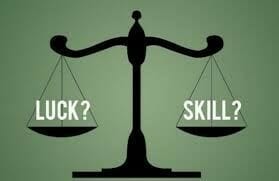“Most of the successes and failures we see are a combination of skill and luck that prove maddeningly difficult to tease apart.” – Michael J. Mauboussin (The Success Equation)
Around the time I turned 21 years old and visited a casino for the first time, I remember someone telling me that the worst thing that could happen to me is winning money on my first trip. I paid no attention to that statement at the time. I was a wide-eyed youngster set to take the house for all they had (with the $100 in cash I had from my job as a bank teller and some help from birthday cards). But the worst thing possible did happen that night, and I came away from the Blackjack table having over doubled my money.
What followed my first tour of success at the table was an inflated ego and overconfidence in my skill in playing cards. Surely none of my success that night could have been due to luck? After all, I had memorized all of the general blackjack tables and basic strategy in the weeks leading up to my first casino trip. I could recite the dealer’s probability of busting based on their hands and even kept my eye on the cards passing, which is the first foray into card counting.
Days later I returned to the tables, this time with a friend as I was eager to show off my newly found skill of turning a casino into my personal ATM. Much to my dismay, I struggled to win a single hand. The house made their money back and then some, along with some more as my friend kindly bought me drinks since I was now broke until pay day.
What happened? I used the same strategy that worked initially, I doubled down when I should have and split when the rules said so. The cards didn’t fall my way that night. That is to say, I failed to recognize the existence of luck and its effect on the outcome of Blackjack, especially over the short term.

Last week an interesting question was posed on Twitter with respect to investing. The question was, if you wanted to quickly determine if someone is a financial expert, what question would you ask them? My response was those who claim expertise with the inability to say “I don’t know” can likely be thrown out.
If there is anything I have learned in over a decade in this business, it’s that I have come to know what I don’t know. In investing psychology, The Dunning-Kruger Effect explains a cognitive bias which plagues individuals with a low level of knowledge in a particular subject, and mistakenly assess their ability as greater than it is. In my first trips to the casino I was fraught with cognitive bias, as was I in the first five plus years as a trader / investor. In short, I attributed any early success to my own skill, and failed to respect the fact that the variable of luck plays a major role in certain endeavors.
As catastrophic as this bias can be when going unrecognized, learning to operate giving the proper weight to luck can increase results dramatically. Pioneers in the study of the psychology of prediction Khaneman and Tversky argue that three types of information are relevant to statistical prediction: Prior information called the base rate, specific evidence about an individual case, and the expected accuracy of the prediction being made. They go on to posit that the key to statistical prediction is knowing how much weight to assign to the base rate and specific case. If the expected accuracy of prediction is low, the base rate should be relied upon heavily. If the expected accuracy is high, it is reasonable to rely more on the specific case.
In market forecasting, you are faced with the monumental task of analyzing millions of participants’ motivations for buying and selling securities. Different strategies, timeframes, variables, and emotion play a significant role in the behavior of price. Especially in the short term, this means your expected accuracy of prediction should be low. That right there pinpoints one of the main issues I see in new traders. I see it in myself at times all these years later.
Failure to recognize the impact of luck on results. On the flipside though, the ability to recognize the impact of luck on results promotes proper risk management and asset allocation. It also helps build proper trading systems in knowing when outliers should be discarded. Pay special attention to that next big win. Whether it was a trade or an investment, luck undoubtedly played a role.
Just as it had on that first trip to the casino.
Trent J. Smalley, CMT
